178,900 enzymatic mudballs to the aid of river restoration project supporting UNSDG
Environmental degradation is high on the contributors’ list for climate change, among humankind’s global challenges. Whilst planting a tree helps protect the environment, getting on the sustainable path makes for an equally important climate action. Management and Science University (MSU) initiates a river restoration project and picks up a new Malaysia record.
The largest Mudball-Throwing Event of the River Revival project had around a thousand volunteers from MSU's International Medical School (IMS) and members of the MSU community launching mudballs into the river behind the MSU campus grounds.
Water eutrophication is one of four crucial environmental impact factors, the other three being air acidification, carbon footprint, and energy consumption.
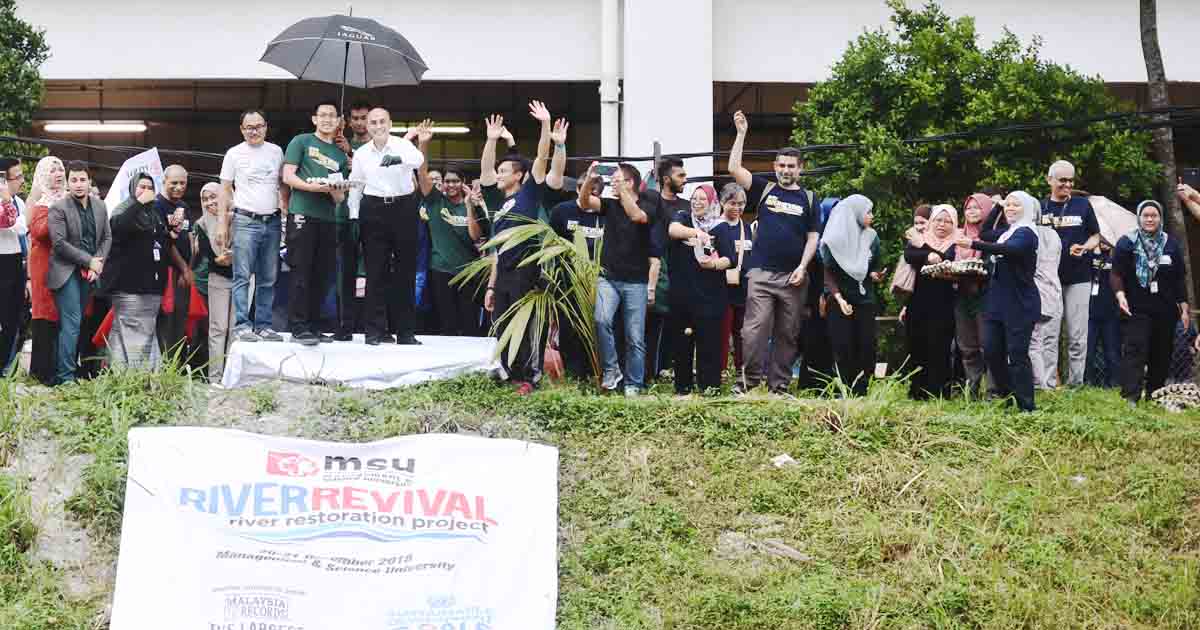
Caused by massive discharges of nitrates and phosphates into the environment, eutrophication is the most common reason inside polluted bodies of water.
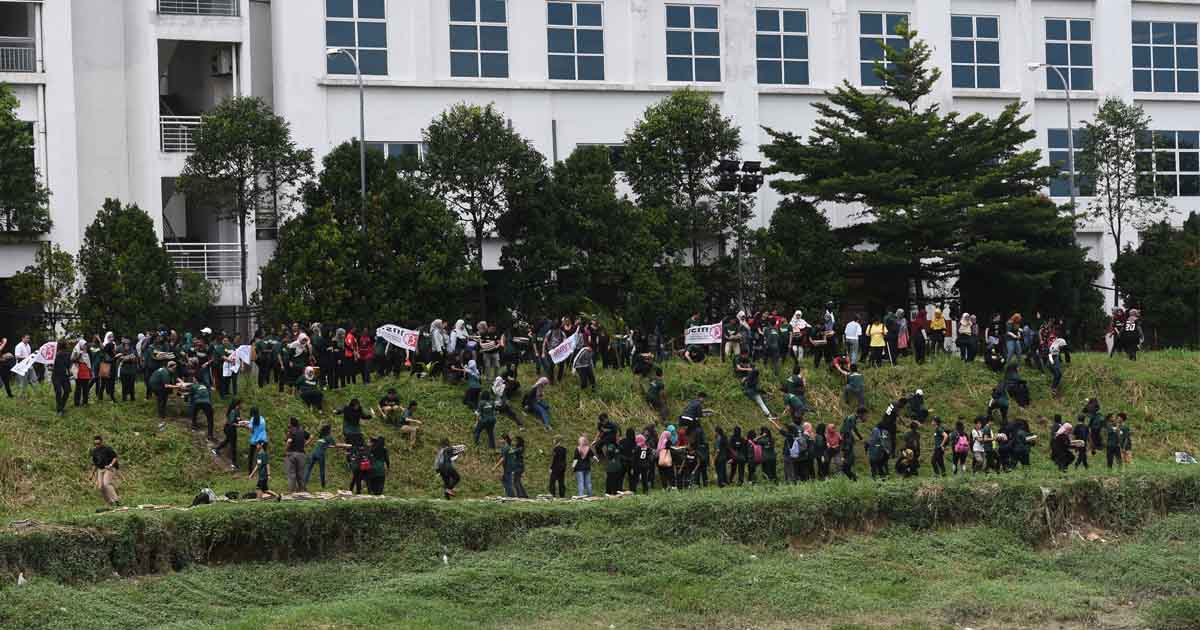
Nitrogen and phosphorus from wastewater and agricultural fertilizer running off from land into water fertilize algae into over-abundance.
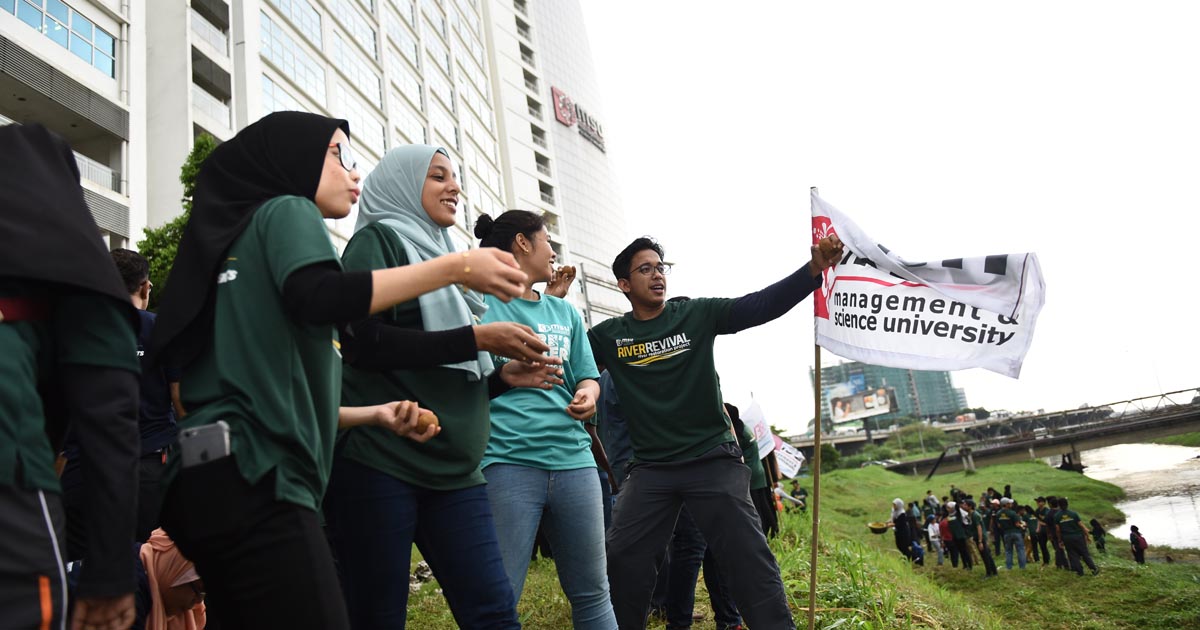
The river habitat is soon depleted of its oxygen content, and its oxygen-starved organic matter consequently ferments into sludge.
Transforming the Damansara river
Sungai Damansara is a 20.75km tributary of Sungai Klang, a heritage river meandering through the state of Selangor and the federal territory of Kuala Lumpur towards the Straits of Malacca. The stretch running the length of the MSU Shah Alam campus right up to the MSU Medical Centre (MSUMC) and the university’s student accommodation The Residence is about half a kilometre.
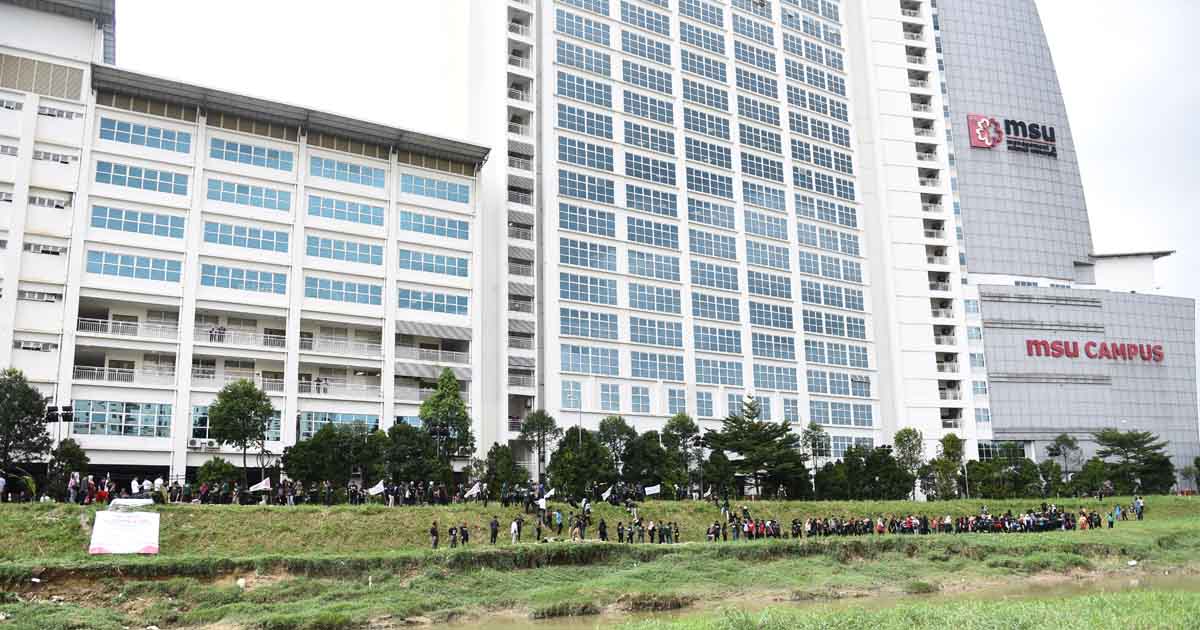
Heritage for the future
To the aid of the friends of the river from MSU were 178,900 enzymatic mudballs made from soil added to a concoction of 1,851 kg fruit peel mixed with brown sugar and water and fermented in 1,234 five-litre bottles for three months. Students across all IMS academic programmes came together for a day of cleaning Sungai Damansara and making the mudballs.

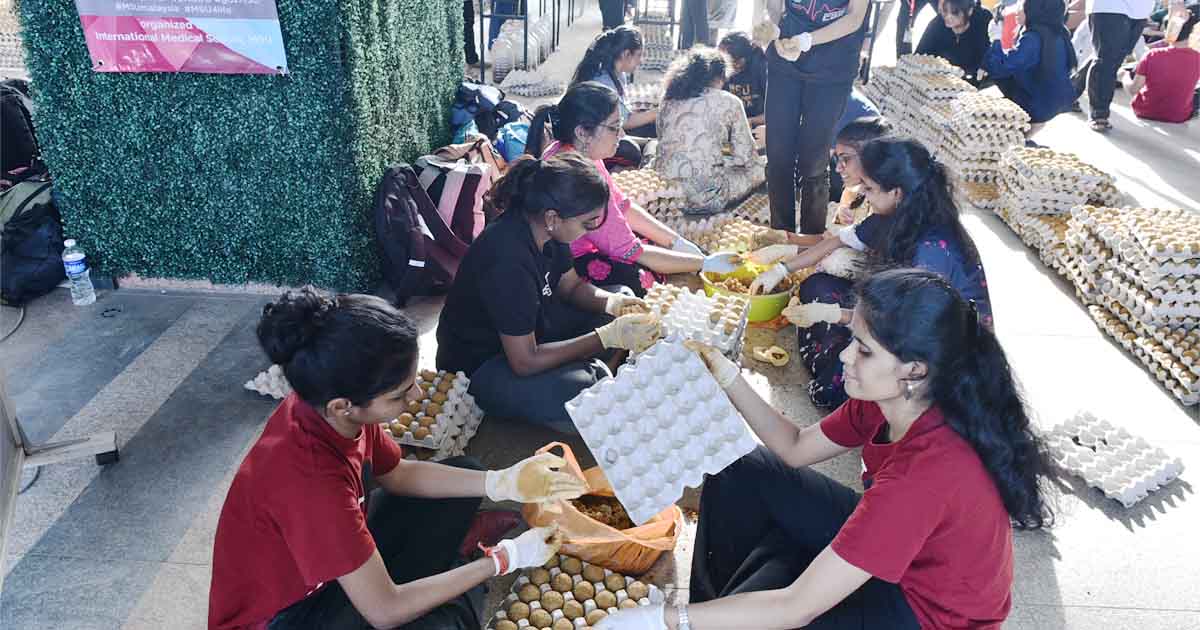

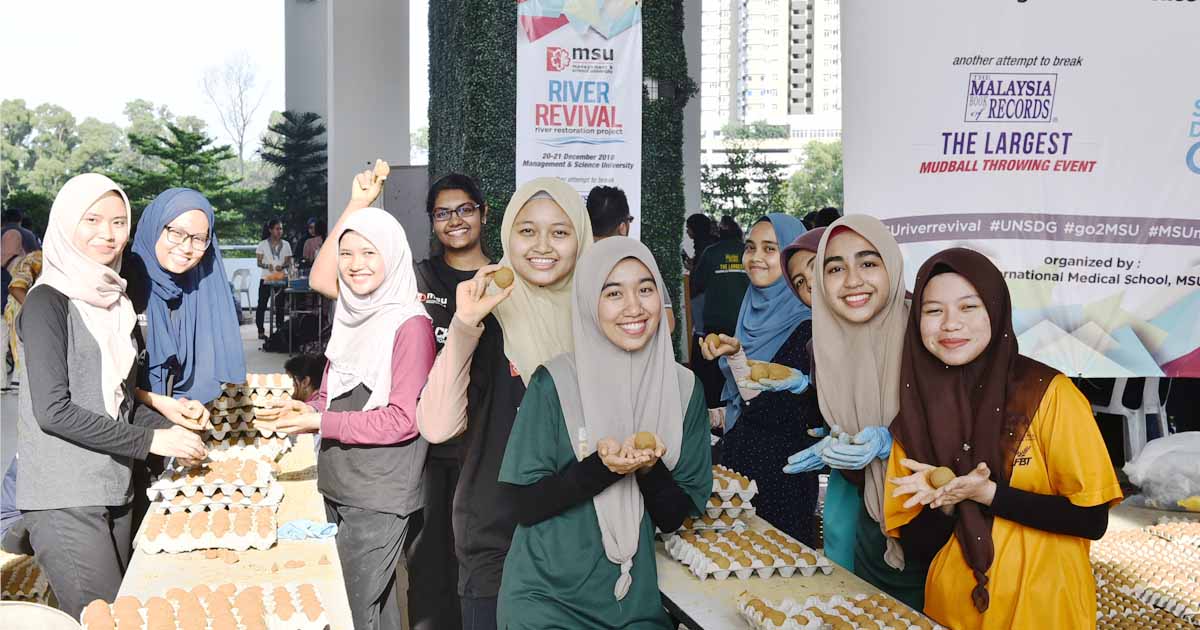
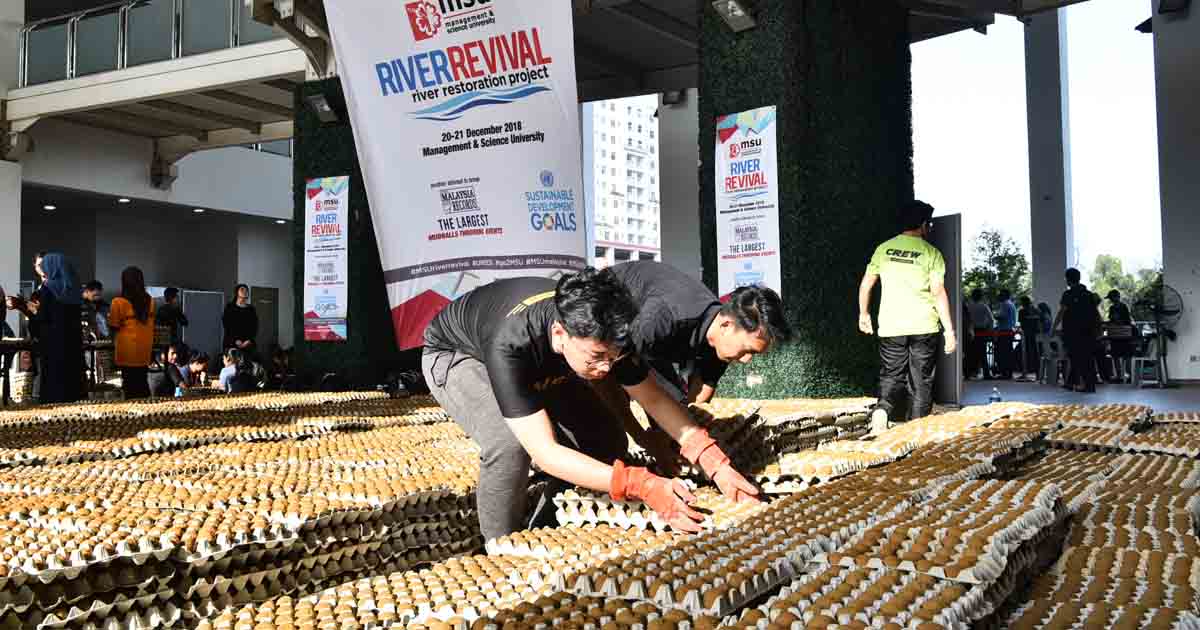
Mudball mechanics
Enzymatic mudballs help by decomposing sludge. The decomposition produces nutrition that feeds oxygen-increasing phytoplankton. The resulting rise of oxygen activates oxidative bacteria, further accelerating sludge decomposition.
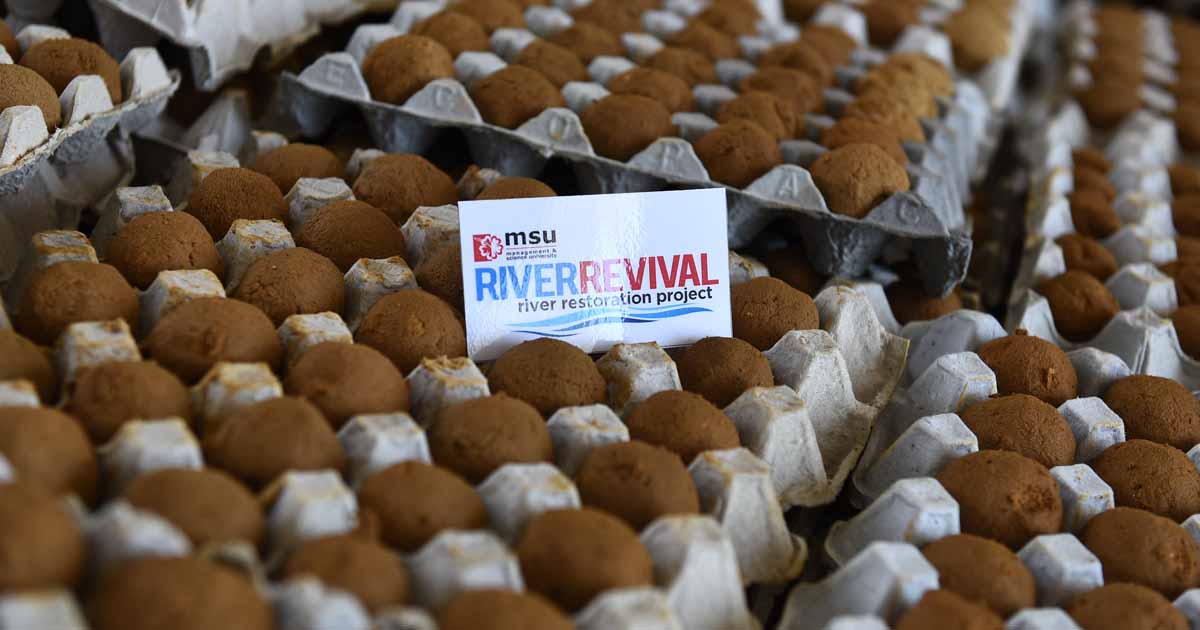
MSU Bachelor in Education (Science) (Honours)
MSU Bachelor in Nutrition (Honours)
MSU Bachelor in Food Service Technology (Honours)
Microbes for more environmental mileage
Meanwhile, zooplankton increasing around the mudballs transform the sludge into detritus, an organic sediment containing microbes. Microbe activity produces oxygen and carbon dioxide bubbles, floating the detritus. Fragmented floating detritus may still give a river the polluted look but as they go on breaking down and flowing along the river, they feed the river’s inhabitants. A river thriving with fish attracts more birds, enriching the river ecosystem.
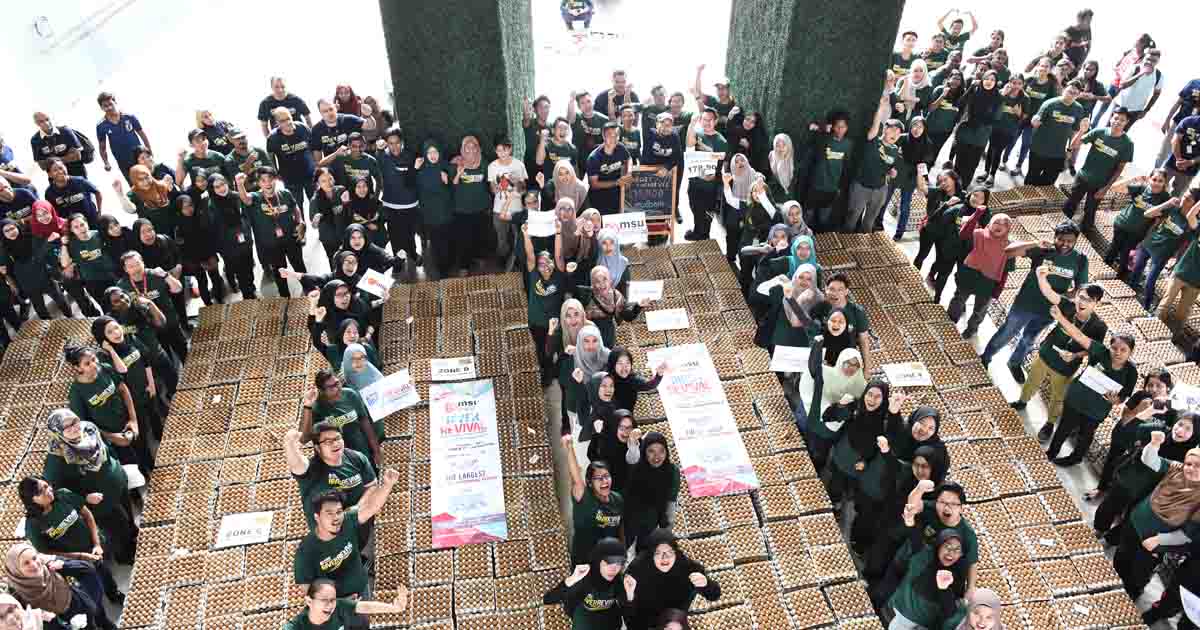
MSU Master of Science (Applied Science)
MSU Doctor of Philosophy (Applied Science)
From river to record
Present on campus, helping with the Effective Mudball (EM) recipe, were volunteers from Sungai Klang Heritage Club; and verifying the 178,900 mudballs for The Largest Mudball-Throwing Event were officials from Malaysia Book of Records (MBR).
This was the 36th MBR entry for Management and Science University (MSU), whose string of Malaysia records places MSU as the university with the most MBR entries.

ASEAN Songket Festival weaves 35th Malaysia record for MSU
River Revival is a project organized by MSU’s International Medical School (IMS) to support the United Nations Sustainable Development Goals in combatting environmental degradation and climate change.
MSU International Medical School (IMS) Bangalore campus is the first offshore medical school awarded a five-year accreditation by the Malaysian Medical Council (MMC).
MBBS students from IMS Shah Alam campus have the option of transferring to IMS Bangalore in their second year.
MSU Bachelor of Medicine and Bachelor of Surgery (MBBS)
MSU Bachelor of Medical Sciences (Honours)
MSU Foundation (Science Biology/Health Science)
IMS forms a part of the MSU Medical and Health Sciences Cluster, which also includes the School of Pharmacy (SPH) and the Faculty of Health and Life Sciences (FHLS).
Medical and Health Sciences cluster brings in 33rd MBR for MSU with Fight Against Depression
MSU Master of Clinical Pharmacy
MSU Bachelor of Pharmacy (Honours)
MSU Bachelor in Traditional Chinese Medicine (Honours)
MSU Bachelor in Health Science Management (Honours)
MSU Bachelor of Science in Pharmaceutical Technology (Honours)
MSU Bachelor of Cardiovascular Technology (Honours)
MSU Bachelor in Nursing (Honours)
MSU Diploma in Medical Assistant
MSU Diploma in Medical Laboratory Technology
MSU Diploma in Radiotherapy
MSUtv: River Revival - River Restoration Project
178,900 enzymatic mudballs to the aid of river restoration project supporting UNSDG
Environmental degradation is high on the contributors’ list for climate change, among humankind’s global challenges. Whilst planting a tree helps protect the environment, getting on the sustainable path makes for an equally important climate action. Management and Science University (MSU) initiates a river restoration project and picks up a new Malaysia record.
The largest Mudball-Throwing Event of the River Revival project had around a thousand volunteers from MSU's International Medical School (IMS) and members of the MSU community launching mudballs into the river behind the MSU campus grounds.
Water eutrophication is one of four crucial environmental impact factors, the other three being air acidification, carbon footprint, and energy consumption.

Caused by massive discharges of nitrates and phosphates into the environment, eutrophication is the most common reason inside polluted bodies of water.

Nitrogen and phosphorus from wastewater and agricultural fertilizer running off from land into water fertilize algae into over-abundance.

The river habitat is soon depleted of its oxygen content, and its oxygen-starved organic matter consequently ferments into sludge.
Transforming the Damansara river
Sungai Damansara is a 20.75km tributary of Sungai Klang, a heritage river meandering through the state of Selangor and the federal territory of Kuala Lumpur towards the Straits of Malacca. The stretch running the length of the MSU Shah Alam campus right up to the MSU Medical Centre (MSUMC) and the university’s student accommodation The Residence is about half a kilometre.

Heritage for the future
To the aid of the friends of the river from MSU were 178,900 enzymatic mudballs made from soil added to a concoction of 1,851 kg fruit peel mixed with brown sugar and water and fermented in 1,234 five-litre bottles for three months. Students across all IMS academic programmes came together for a day of cleaning Sungai Damansara and making the mudballs.





Mudball mechanics
Enzymatic mudballs help by decomposing sludge. The decomposition produces nutrition that feeds oxygen-increasing phytoplankton. The resulting rise of oxygen activates oxidative bacteria, further accelerating sludge decomposition.

MSU Bachelor in Education (Science) (Honours)
MSU Bachelor in Nutrition (Honours)
MSU Bachelor in Food Service Technology (Honours)
Microbes for more environmental mileage
Meanwhile, zooplankton increasing around the mudballs transform the sludge into detritus, an organic sediment containing microbes. Microbe activity produces oxygen and carbon dioxide bubbles, floating the detritus. Fragmented floating detritus may still give a river the polluted look but as they go on breaking down and flowing along the river, they feed the river’s inhabitants. A river thriving with fish attracts more birds, enriching the river ecosystem.

MSU Master of Science (Applied Science)
MSU Doctor of Philosophy (Applied Science)
From river to record
Present on campus, helping with the Effective Mudball (EM) recipe, were volunteers from Sungai Klang Heritage Club; and verifying the 178,900 mudballs for The Largest Mudball-Throwing Event were officials from Malaysia Book of Records (MBR).
This was the 36th MBR entry for Management and Science University (MSU), whose string of Malaysia records places MSU as the university with the most MBR entries.

ASEAN Songket Festival weaves 35th Malaysia record for MSU
River Revival is a project organized by MSU’s International Medical School (IMS) to support the United Nations Sustainable Development Goals in combatting environmental degradation and climate change.
MSU International Medical School (IMS) Bangalore campus is the first offshore medical school awarded a five-year accreditation by the Malaysian Medical Council (MMC).
MBBS students from IMS Shah Alam campus have the option of transferring to IMS Bangalore in their second year.
MSU Bachelor of Medicine and Bachelor of Surgery (MBBS)
MSU Bachelor of Medical Sciences (Honours)
MSU Foundation (Science Biology/Health Science)
IMS forms a part of the MSU Medical and Health Sciences Cluster, which also includes the School of Pharmacy (SPH) and the Faculty of Health and Life Sciences (FHLS).
Medical and Health Sciences cluster brings in 33rd MBR for MSU with Fight Against Depression
MSU Master of Clinical Pharmacy
MSU Bachelor of Pharmacy (Honours)
MSU Bachelor in Traditional Chinese Medicine (Honours)
MSU Bachelor in Health Science Management (Honours)
MSU Bachelor of Science in Pharmaceutical Technology (Honours)
MSU Bachelor of Cardiovascular Technology (Honours)
MSU Bachelor in Nursing (Honours)
MSU Diploma in Medical Assistant
MSU Diploma in Medical Laboratory Technology
MSU Diploma in Radiotherapy
MSUtv: River Revival - River Restoration Project